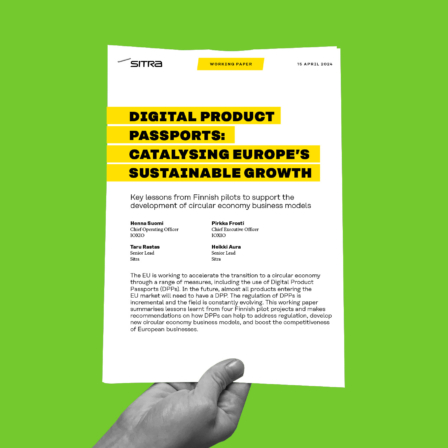Digital waybills have great potential for the logistics industry. They can significantly improve efficiency in the sector and increase transparency in transport chains.
Waybills are transport documents that serve as transport contracts and proof of receipt of transported goods. In international transport, the use of waybills is mandatory by law.
The digitalisation of transport data improves data management for all companies in the transport chain and reduces manual work related to document processing. All this makes companies more efficient. According to the Sitra memorandum (in Finnish, summary in English), an estimated 30 million waybills and 100 million other transport-related documents are created in Finland every year. Most of these documents are in paper format.
Savings potential in processing costs
A Belgian study estimated that one paper waybill costs €23 to process, while the processing of its digital equivalent costs only €10. According to Traficom, the savings potential could be even greater: the cost of digital waybills would be only one to two euros per document if the data transfer between different systems was automated. The potential of digitalising waybills can be considered significant in terms of both the efficiency of the Finnish economy and the competitiveness of companies.
The digitalisation of waybills also offers other benefits. When transport-related data can be transferred from one transport chain operator to another, both the transport company and the cargo owner can monitor the transport processes in real time. Any errors or delays can be detected and corrected quickly.
The Electronic Freight Transport Information Regulation adopted by the European Union will speed up the digitalisation of transport data in the coming years. The Regulation will become binding in early 2027.
Electronic Freight Transport Information Regulation
The EU Electronic Freight Transport Information (eFTI) Regulation will promote the transition from paper to digital waybills among logistics sector companies.
The Regulation will be come into force in early 2027 and will create a uniform legal framework requiring public authorities to accept transport data in electronic form. This will improve the flow of information between the public authorities, economic operators and businesses in the Union. For the time being, the Regulation does not oblige operators other than the public authorities.
Experiment investigated the flow of information in digital transport documents
Sitra has supported the logistics industry’s digitalisation transition by funding an experiment of digital waybills. With its partners, the Finnish transport company Flowertrucks Oy piloted the use of digital waybills in transport. Flowertrucks transports flowers, vegetables and fruits from Southern and Central Europe to Finland.
The aim of the pilot project was to find out what the digitalisation of transport documents requires from different operators, and what challenges still need to be solved in the flow of information between them.
The experiment also involved the company to which Flowertrucks provides transports, as well as the technology companies Vediafi Oy and iToDEV (LT), which were responsible for the technical implementation of the pilot project and the analysis of the compliance of data transfer with the eFTI Regulation. The experiment lasted from January to August 2024.
Diversity of systems poses a challenge
The experiment provided practical lessons about the capabilities and challenges of commercial operators in implementing digital waybills and matching existing information systems with the eFTI requirements.
According to the pilot participants, the challenges were the integration of the operators’ systems and their different capabilities and abilities to implement the solutions developed in the experiment.
The harmonisation of data also posed challenges: the same data may be entered in different ways in different places, depending on the system and the operator. For example, in one system, the recipient’s address information was entered as one string in one field, including the street address, building number and postcode. In another system, each of these data were recorded in their own fields.
One solution could be the EU-level standardisation of transport data.
The pilot project also found that it would be useful to have a system testing environment, as making development-phase changes in the production environment can disrupt companies’ business.
When digitising transport chain data, it is also important to note that not all transport chain data are relevant to all operators. For example, transport companies do not use stored data related to the transported goods themselves, such as temperature measurements of food, but they are essential for customers and indicate whether a transport batch has been spoiled.
Transport chains became more efficient, job meaningfulness improved
The pilot project found that the digitalisation of transport documentation makes transport chains more efficient. There are plenty of small transport companies in Finland, and often one or two people are in charge of transport planning. They will be needed in the future as well, and in small operators, improving efficiency does not necessarily lead to a reduction in human resources.
However, the pilot participants estimated that more efficient operations would improve the meaningfulness and quality of work, as personnel’s duties would become easier and faster. For example, a team of one or two people in charge of transport management planning would be able to manage a larger number of transports without compromising quality. The number of human errors will also be reduced when different transport chain operators do not manually process documents.
Read more
More information about the phases of the pilot and the lessons learned (in Finnish) is found on the Vedia website.
Sitra’s Data and Competitiveness project has long cooperated with logistics companies and ecosystems and explored the possibilities of sharing and utilising data to solve logistics and transport challenges. Sitra aims to promote the building of a fairer data economy and to help companies use data more efficiently.




